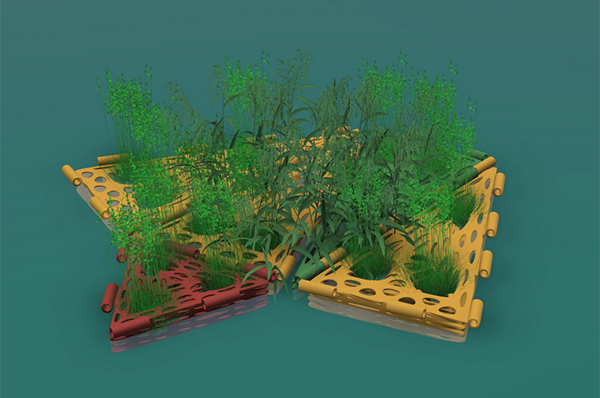Some young students mentored at the University of Louisiana at Lafayette have developed a device to counteract dead zones that decimate marine life and habitat.
Team Phoenix, a group of students from Lafayette whose ages range from 11 to 14, is seeking a provisional patent application for its Floating Island Sustainable Habitat or FISH. “The document basically safeguards their concept for one year while they finish up their submission,” said Dr. Doug Williams, a professor of education, who coaches the team at UL Lafayette’s Center for Innovative Learning and Assessment Technologies.
FISH is a grid of interlocking, floating panels made of biodegradable plastic. The porous system supports root growth and holds plants that absorb nutrients. A surplus of nutrients can cause dead zones, such as one in the Gulf of Mexico.
Runoff from the Mississippi River deposits nutrients, such as nitrogen and phosphorous, from farmland or sewage treatment plants, into the Gulf. Nutrient overload reduces the amount of oxygen in the water. Low oxygen levels have created a roughly 6,000-square-mile dead zone – an area about the size of Connecticut – where little marine life survives, according to the National Oceanic and Atmospheric Administration.
“Team Phoenix’s floating habitat draws nutrients out of the water, and it also creates new, sustainable habitat for creatures,” Williams explained.
FISH is the only model that Williams knows of that is made of biodegradable plastic, has scalable geometric shapes, and has an app that enables a user to design the island to certain specifications.
“In addition to size, the app lets you calculate costs and shows which indigenous plants would be appropriate for a particular floating island, based on location, for example,” Williams said.
The students will present their project from June 18-20 in Washington, D.C., as one of 20 semifinalists from around the world that will vie for the First Lego League Global Innovation Award.
One team will land a top prize of $20,000. Two runners-up will each receive $5,000.
The students developed FISH with feedback from UL Lafayette professors in disciplines such as architecture, biology, chemistry, engineering and design. They also tapped the expertise of industry professionals, such as mechanical engineers.
“It really could have a huge, possibly very profound impact on the environment,” Williams said.
Team Phoenix is the first from Louisiana ever selected to compete for the Global Innovation Award. It was chosen from 130 submissions from 30 countries. The team earned the right to have its project considered by claiming the Champion’s Award at the state’s First Lego League Championship in December.
As part of FLL competition, students design, build and program autonomous robots covered in Lego toy pieces that are capable of completing a variety of tasks. They also complete a research project.
In addition to a spot in the global innovation competition, the state win also earned Team Phoenix a spot in the recent First Robotics World Festival Championship in Houston. The team claimed the Judges Award at that competition, which is given for “noteworthy achievements and ideas,” according to Williams.
Team Phoenix members include: Benjamin Chopin, 14; Jacob Landreneau, 14; Jack MacFadyen, 11; Miguel Pagán, 12; Aaron Williams, 13; and Joseph Williams, 11. All students are from Lafayette. Aaron Williams attends John Paul the Great Academy. The other students are homeschooled. Past team members Francisco Pagán, 16, who is homeschooled, and Caleb Williams, 16, who attends John Paul the Great Academy, helped mentor this year’s team.
Learn more about First Lego League at http://www.firstlegoleague.org/
Image: The Floating Island Sustainable Habitat developed by a group of young students mentored at UL Lafayette features a grid of interlocking, floating panels. The porous system is made of biodegradable plastic and holds plants that absorb nutrients to combat dead zones that are harmful to marine life and habitat.
